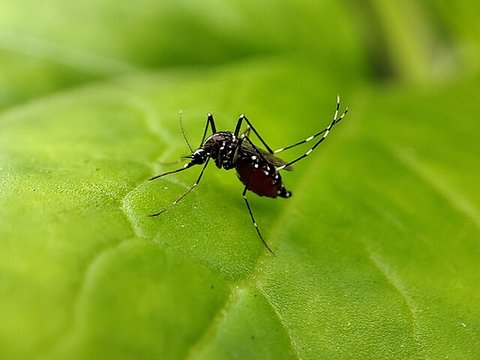
11 Oct More Invasive Yellow Fever Mosquitoes Found in Antioch

Aedes aegypti mosquitoes, like the one here, can transmit Zika, dengue fever, Chikungunya, and yellow fever viruses and have been found in Antioch. (“Aedes aegypti on leaf” by Wee Hong via Wikimedia Commons / CC BY-SA 4.0 license)
By Tony Hicks
Bay City News
Contra Costa County officials said Friday additional invasive yellow fever mosquitoes have been found this week at various locations in Antioch.
This day-biting mosquito species, also known as the Aedes aegypti, is capable of transmitting Zika, dengue fever, Chikungunya, and yellow fever viruses.
In response, the Contra Costa Mosquito and Vector Control District will continue to perform more door-to-door inspections on Saturdays in the area bordered by state Highway 4 to the north, Bluerock Drive to the south, Lone Tree Way to the west, and Deer Valley Road to the east.
The district first identified Aedes aegypti mosquitoes in Antioch in late September, when they were collected during a backyard inspection.
As additional trapping and inspections were conducted in the neighborhood, more invasive mosquitoes were found, prompting the district to set mosquito traps throughout the area and conduct door-to-door inspections to determine how widespread the infestation was.
The district said it found mosquito larvae (young mosquitoes) in common backyard items that can hold water, including potted plant saucers, buckets, wheelbarrows, fountains and toys.
As more adult and young mosquitoes are found, the district’s search area continues to expand.
“The fact that we continue to find young and adult mosquitoes as we expand our search area suggests this mosquito population may have been in Antioch for at least several months,” said Steve Schutz, the district’s scientific programs manager, in a statement. “We will continue to conduct surveillance and inspections until the weather cools this year and mosquito activity becomes less likely,”
Aedes aegypti mosquitoes are very small (about 1/4 inch), with black bodies and white stripes. They were first introduced to Southern California more than 10 years ago. They’ve since moved from Southern California to Shasta County and are now established in 24 counties across the state.
Because these mosquitoes lay sticky eggs above the water line in any size container that holds water, they can be transported to new areas easily and are often introduced through travel, particularly as people move from area to area and accidentally transport them in potted plants or other outdoor containers.
To reduce the risk of these mosquitoes, it is important that residents dump out any amount of standing water, place liquid soap on a scrub brush, and scrub the now-empty bird baths, containers, outdoor pet dishes, garden pots, buckets, potted plant saucers, and anything that holds water outdoors.
The district asks people to report any day-biting mosquitoes by contacting them at (925) 685-9301 or at https://contracosta.leateamapps.com/#/public/servicerequest.
The district will host a community meeting in Antioch next weekend to meet with residents, answer any questions they have, and explain the district’s next steps. The meeting will be held at 10 a.m. Oct. 19 at Harbour Park in Antioch.
Copyright © 2024 Bay City News, Inc. All rights reserved. Republication, rebroadcast or redistribution without the express written consent of Bay City News, Inc. is prohibited. Bay City News is a 24/7 news service covering the greater Bay Area.



No Comments